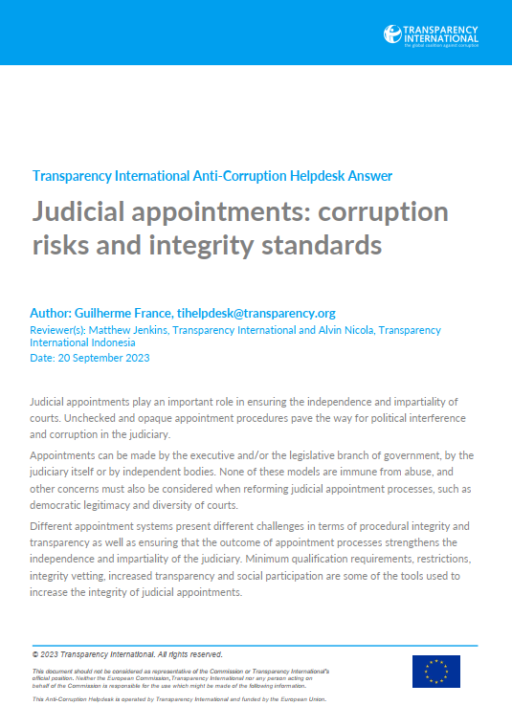
This Anti-Corruption Helpdesk brief was produced in response to a query from one of Transparency International’s national chapters. The Anti-Corruption Helpdesk is operated by Transparency International and funded by the European Union.
Query
Provide an overview of judicial appointment proceedings, including the main risks associated with inadequate proceedings and integrity standards used to mitigate them.
Summary
Judicial appointments play an important role in ensuring the independence and impartiality of courts. Unchecked and opaque appointment procedures pave the way for political interference and corruption in the judiciary.
Appointments can be made by the executive and/or the legislative branch of government, by the judiciary itself or by independent bodies. None of these models are immune from abuse, and other concerns must also be considered when reforming judicial appointment processes, such as democratic legitimacy and diversity of courts.
Different appointment systems present different challenges in terms of procedural integrity and transparency as well as ensuring that the outcome of appointment processes strengthens the independence and impartiality of the judiciary. Minimum qualification requirements, restrictions, integrity vetting, increased transparency and social participation are some of the tools used to increase the integrity of judicial appointments.
Main points
- Robust judicial appointment proceedings can help strengthen the independence and impartiality of the courts.
- Inadequate proceedings, on the other hand, increase the risks of corruption and political interference in the judiciary.
- There are different appointment systems, and each carries specific risks and can offer different advantages, such as increased independence of the courts, democratic legitimacy, and diversity.
- Minimum qualification requirements, restrictions for appointees, integrity vetting, increased transparency and social participation are some of the integrity-related tools used to improve appointment proceedings.
Contents
- Introduction
- Judicial appointments: risks and rewards
- Principles and standards for judicial appointments
- Different systems for judicial appointments
- Integrity standards
- References
Caveat
This Helpdesk Answer focuses, primarily on, appointments to high-level courts and strategic positions within the judiciary, such as anti-corruption courts and electoral courts. The paper does not cover post-appointment integrity standards, such as codes of conduct, disciplinary procedures, and impartiality issues in procedural law. The paper also does not deal with oversight functions within the judiciary.
Some of the rules and standards mentioned in this paper may be applicable to other types of appointments to bodies in the justice system, for example the prosecutorial services, and other institutions, such as National Audit Courts.
Authors
Guilherme France, [email protected]
Reviewers
Matthew Jenkins, Transparency International and Alvin Nicola, Transparency International Indonesia
Date
05/10/2023

